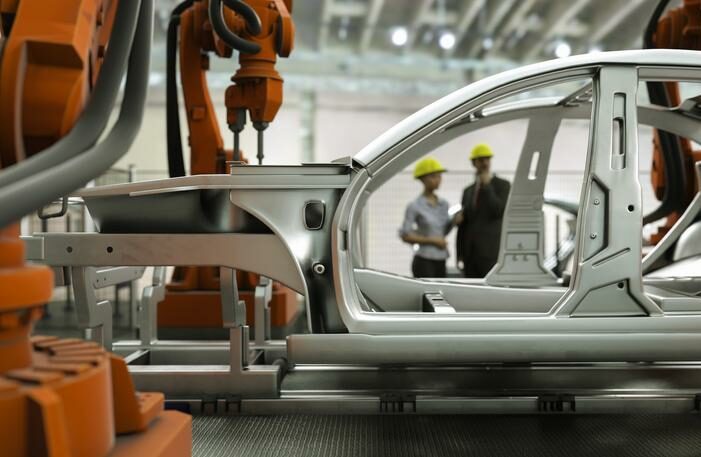

Dive into the fascinating world of production relocation in the industry, a topic that has gained increasing importance in recent years. German industrial companies, especially in the automotive industry and the chemical industry, are discovering the benefits of shifting operations abroad and relying on professional management.
Find out more about how companies are benefiting from this change and which interim solutions are being discussed in politics. Be inspired by successful examples and valuable advice for your next entrepreneurial endeavour.
Why are there production relocations in the industry?
In recent years, German industrial companies have increasingly recognized the advantages of relocating production abroad. The search for new locations outside Germany offers opportunities for growth and efficiency gains. According to DIHK studies, many companies are ready to invest in international relocations to expand their production capacities and cut costs. Management plays a crucial role here by making the right decisions and coordinating implementation effectively. Financing a production transfer must be carefully planned to minimize risks and use resources optimally. Interim management can provide valuable support during this phase.
Communication with employees during the relocation process is equally important to reduce uncertainty and maintain a motivated team. Ultimately, a successful production relocation not only creates new opportunities but also enhances the competitiveness of German industrial companies.
Production relocation checklist – from planning to implementation
Moving the production of a product or service to another location requires thorough planning and monitoring to ensure that the process runs smoothly and no major problems occur. Here is a general checklist for production relocation:
Objectives and strategy:
Clear definition of the objectives and reasons for relocating production.
- Definition of long-term strategic goals and expectations.
Site selection:
- Evaluation of potential locations based on costs, infrastructure, labour, legal framework and more.
- Carrying out site analyses and risk assessments.
Budgeting and resource planning:
- Determination of the budget for the relocation.
- Resource allocation for the move, including finance, human resources and technology.
Communication and stakeholder management:
- Clear communication with all stakeholders involved, including employees, suppliers and customers.
- Develop a communication plan to inform all relevant parties about the progress and impact of the relocation.
Legal and regulatory aspects:
- Review and compliance with all legal and regulatory requirements at both the old and the new location.
- Securing the permits and licences for operation at the new location.
Infrastructure and logistics:
- Ensuring the availability of infrastructure such as factories, warehouses, power supply, water, transport facilities, etc.
- Planning and implementation of efficient logistics solutions for the transport of raw materials, products and other materials.
Quality assurance and process optimisation:
- Review and adaptation of production processes and quality standards at the new location.
- Implementation of quality control measures to ensure that product quality is maintained.
Personnel management:
- Planning and organising training courses for employees at the new location.
- Consideration of personnel adjustments and employment contracts.
Technological infrastructure:
- Evaluation of the existing technological infrastructure and adaptation to the new location.
- Ensuring the availability of IT systems and other technical support.
Risk management:
- Identification of potential risks and development of risk minimisation measures.
- Establishment of a control and monitoring system to monitor the relocation process and recognise problems at an early stage.

1. Planning and preparation for a successful production relocation in the industry
With a clear timeline and a detailed checklist for production relocation in the industry, German companies can smoothly expand abroad or into Europe. Preparation plays a crucial role in identifying and minimizing potential risks at an early stage. The selection of the new location should be made carefully, taking finances and political conditions into account. Efficient management during the relocation process is essential to ensure a smooth transition. Technological aspects, such as the integration of new production facilities, must also be considered to guarantee seamless operations. Employee training after the successful relocation secures long-term success and efficiency at the new site.
2. Selecting the new location for production relocation
Choosing the new location for a production relocation in the industry is a decisive step for the success of your company. When searching for suitable sites abroad or within Germany, German industrial companies must carefully weigh the advantages. A thorough analysis of political and financial conditions is essential to secure long-term success. Interim and long-term goals must be clearly defined to make the right decision. The latest developments in production technology should also be taken into account to optimize your processes. Communication and transparency are key factors for a smooth relocation of your production to the new site. Ultimately, a well-founded site selection will help strengthen your company in the global market and promote sustainable growth.
3. Logistics and transport in production relocation
Efficient logistics and smooth transport play a decisive role in production relocation in the industry. Careful planning and coordination of all logistical processes are essential to ensure a seamless transition. From packaging and labeling to selecting the appropriate transport system, every step must be precisely organized. Special attention should also be given to customs regulations and international shipping requirements, especially in cross-border relocations. An experienced team of logistics experts can help overcome challenges and maximize the advantages of an efficient supply chain. Through clear communication and close cooperation with all parties involved, a successful transport process can be guaranteed so that the relocation runs without unforeseen complications.
4. Communication with employees during production relocation in the industry
Communication with employees during a production relocation in the industry is essential for a smooth process. It is important that employees are actively involved and regularly updated on the status of the relocation. Transparency builds trust and reduces uncertainties that often accompany change. Open discussions allow concerns and fears to be addressed, creating joint solutions. A well-informed team is more motivated and works more efficiently toward the success of the production relocation. Employee support throughout the process is decisive for the success of the entire company. Honest and open communication strengthens team spirit and helps everyone look positively to the company’s future.
5. Technological aspects
The integration of new technologies is critical for a successful production relocation in the industry. Modern manufacturing methods and automated processes can significantly increase efficiency and productivity.
German industrial companies benefit from advanced technologies that enable them to remain competitive abroad. Digitalization plays a central role in optimizing production workflows and quality control.

6. Employee training after a successful production relocation in the industry
A successful production relocation requires comprehensive employee training to ensure that all team members are familiar with the new processes. Actively involving employees and preparing them for the changes is essential. Targeted training can eliminate uncertainties and guarantee a smooth transition. Training should cover both technical and organizational aspects to optimally prepare the team for the new production environment. Open communication and management support are also key to fostering employee motivation and commitment. Ultimately, effective training plays a decisive role in the long-term success of production relocation in the industry.
7. Quality control and process optimization after production relocation
After a production relocation in the industry, it is vital to maintain strict quality control and focus on process optimization. A change of location may bring new challenges that require close monitoring of production workflows. Quality assurance plays a central role in ensuring that standards are consistently met at the new site. Effective process optimization helps detect and eliminate bottlenecks early. With continuous improvements, companies can boost efficiency and secure competitive advantages. The close connection between quality control and process optimization is therefore essential for the long-term success of a production relocation in the industry.
Conclusion: Successful relocation – efficient production at the new site!
Relocating the production of an industrial company offers numerous benefits, especially when it comes to increasing efficiency and entering new international markets. Careful planning and smooth execution are decisive for the success of this complex process. Once the relocation is complete, it is essential to monitor quality and continuously optimize processes at the new location. Employee training plays a key role in adapting to new workflows and technologies. Open communication with staff throughout the process fosters understanding and motivation. With this holistic approach, production relocation ultimately ensures efficient manufacturing at the new site.
Successful production relocation – with us as your partner!
Are you looking for an experienced partner for your production relocation? At Zeitarbeit International, we support you every step of the way. We are happy to provide you with references or invite you to visit partner companies or already relocated production sites. From chocolate production in Hungary to metal or stainless steel processing and stainless steel assembly in Poland and Romania.

Whether nearshoring or Outsourcing– we are your partner when it comes to assembly or production in all areas of relocation. From German-speaking managers to on-site supervisors, our team takes care of everything and represents your company abroad successfully, legally compliant, and goal-oriented. Learn more about us >>>
Frequently asked questions:
What is a production relocation?
Relocation of production refers to the process of moving the production of goods or services from one location to another. This can take place within a country or across borders. Production is often relocated in order to reduce costs, for example through cheaper labour or tax advantages in another country. Companies may also decide to relocate their production closer to the sales markets in order to minimise transport costs and delivery times.
Why move production abroad?
Production is relocated abroad for various reasons:
- Reducing costs, as labour and resources are cheaper in some countries.
- Access to new customers and business opportunities.
- Optimisation of the production process by using specialised expertise and technologies in other countries.
- Tax benefits and regulatory incentives.
Overall, relocating production abroad offers many strategic advantages for companies to remain competitive and maximise their growth potential.
Why do we produce abroad?
Cost savings: Companies can often find cheaper labour, raw materials and production costs abroad. This enables them to offer their products at lower prices and be more competitive.
Access to resources: In some countries, there is better access to certain resources such as raw materials, energy or specialised labour. Relocating production to such locations can increase efficiency and improve quality.
Market development: By setting up production facilities abroad, companies can improve their access to new markets. This enables them to better serve local customers and expand their market presence.
Risk diversification: Diversifying production sites can protect companies from risks such as political instability, natural disasters or currency fluctuations. If one location is affected, production can be continued at other locations.
Capacity expansion: If demand for a product increases, relocating production abroad can help to expand production capacity and avoid bottlenecks.
Competitive advantage: In some cases, companies abroad can use more advanced technologies, production processes or expertise to gain a competitive advantage.
What can go wrong when relocating production?
Various problems can arise when relocating production:
Logistics problems: There may be difficulties in transporting equipment, raw materials and finished products.
Quality problems: Product quality can suffer if the new production sites do not have the same standards as the old ones.
Communication problems: Misunderstandings between the teams at the new and old locations can lead to delays and errors.
Budget overspending: The relocation can be more expensive than expected due to unforeseen expenses or inefficient planning.
Loss of skilled labour: Experienced employees could leave the workplace or find it difficult to adapt to new processes.
Legal problems: Problems with authorisations, certifications or contracts can delay or hinder the relocation process.
Technical challenges: Problems can arise with the integration of new technologies or the incompatibility of systems.
Loss of productivity: Productivity could drop temporarily while teams adapt to the new work processes.
Image and customer relationship problems: Customers could be dissatisfied or lose confidence in the company if problems arise during the relocation.
Regulatory risks: Violations of environmental or labour laws at the new location can lead to legal problems.
It is important to anticipate these potential problems and take appropriate measures to avoid or minimise them. Careful planning, clear communication and continuous monitoring are crucial to ensure a smooth relocation process.
Who can support the relocation of production?
- Management consultant / personnel service provider: Consultancy firms specialising in production relocation can assist companies in planning, implementing and monitoring the relocation process. They offer expertise, advice and customised solutions for the company's specific requirements.
- Legal experts: Lawyers and legal advisors can assist companies with the legal aspects of relocating production, including contract negotiations, legal requirements at the new location, regulatory compliance and intellectual property protection.
- Logistics company: Logistics companies can support companies in organising the transport of production facilities, machines, raw materials and finished products. They also offer solutions for warehousing, distribution and shipping.
